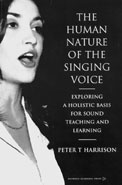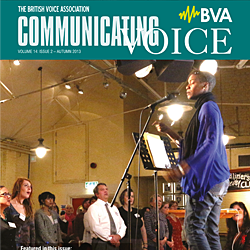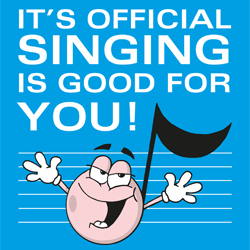About the Association
Archived book reviews
 The Human Nature of the Singing Voice - Exploring a Holistic Basis for Sound Teaching and Learning
The Human Nature of the Singing Voice - Exploring a Holistic Basis for Sound Teaching and Learning
Peter T Harrison
Dunedin Academic Press (paperback)
Review by: Nichola Christie L.R.A.M L.T.C.L, Singer, Actress,Writer, Lecturer in Voice at Southampton University
Having studied with Peter Harrison whilst at the Royal Academy of Music it was with great anticipation that I read his long awaited writings on The Human Nature of the Singing Voice. Back in the 1970s and 80s colleges had the traditional style of teaching and most students kept to that path wanting a route through to exam success and hopefully a career beyond. Peter Harrison had a different vision – a vision for the voice alone, creating his own path, not prepared to buy into the system for its own sake. Himself a student of the Husler School of thought working with Yvonne Rodd-Marling, Joy Mammen and Pieter van der Stolk he gives due credit for the liberating philosophy that has been his inspiration.
The Human Nature of the Singing Voice is a testament to that vision – his passion for the natural voice and its survival. Once again he is prepared to step into new territory with a fascinating, intimate, holistic perspective of singers and the voice, and the art of teaching the same; a courageous step from the purely scientific or academic approach. With nods towards psychology, philosophy and occasionally some esoteric moments these writings are of the new generation inspired by a desire to keep with us the wonderful instrument that is the natural voice.
From it's very beginnings ‘Civilisation of the Human Voice' through the inner work ‘Sounding the Self' and ‘The Communicating Imperative' to an historical perspective ‘Back and Beyond – redefining Bel Canto' we are guided through his thoughts - an informed line from the writings of Garcia, underscored with the findings of Husler and Rodd-Marling , the thoroughness of Cornelius Reid and finally his own observations and work with singers over 35 years. This is detailed writing, revealing the innermost workings of the singer, the voice, and the teacher; informed advice drawn from experience. Illuminating diagrams give us a protective, passionate life journey that is his philosophy of the natural voice.
Typically he is strongly against the use of a purely scientific approach regarding it as a quick fix with the potential for long-term damage. John Tomlinson, amongst other great singers of today, has also expressed the fear that the natural ‘classical' sound is disappearing in the face of a "quick fix" technique and the use of microphones so I am sure, for some, these writings will be welcomed. However, as with any science versus philosophy debate there is room for learning from each, it is up to teachers to keep questioning and to be well informed. There are some great singers using microphones just as there are some classical singers singing badly…..I am optimistic in believing that singers today aren't all after an immediate result with fame and fortune. A lengthy purist route to a sustainable classical career is,I fear, for the few and we as teachers have to be realistic with our students as they too are aware that the commercial side of music is more likely to provide a career and a reasonable living. We should be guiding them to their full potential, equipped with the knowledge and technique to facilitate a long and varied career.
The sound that is Musical Theatre, Jazz, Rock and Pop is developing rapidly – often with fusion of the classical sound .New sound by definition doesn't have to mean bad and my experience is of students having a passion for voice, needing a strong free adaptable sound that is their own with which to express and communicate to their own generation - they need a route through dangerous territory…
The Human Nature of the Singing Voice guides us from the beginnings of that communication through the perilous journey of releasing the voice to the joyous freedom of our natural unique sound. Ironically this new generation of sound are the ears for this information – the ‘Knowledge' generation - familiar with the holistic ‘Mind, Body, Spirit" approach in other areas of life and it is they that will take it forward.
Having parented this inspired philosophy Peter Harrison will now have to allow singers and teachers to have their own life journey and experience, make their own mistakes and learn from them, but I am sure many will carry this invaluable insight with them on that path.
Editor's overview
At the beginning of my teaching career the Frederick Husler and Yvonne Rodd-Marling Physical Nature of the Vocal Organ was my favourite reference book so it was comforting during the first read through Peter T Harrison's book to see familiar diagrams and revisit ideas that have influenced the writer's philosophy.
I found the first part – Civilisation of the Human Voice – a little repetitive and negative in attitude, as though speaking in a vacuum; for stating that work with singers rarely begins before the late teens may be true in Conservatoires but for the mainstream singing teacher (who may purchase this book) healthy habits and enthusiasm need to be nurtured from an early age. I would also question that exercises are vocal props, understanding how something works can interfere with the natural process or that musical and verbal elements, words and music, should be left until later in a singer's development.
However, my heart lifted during the second section when Harrison began to share his journey in teaching especially when revisiting vocal truths based on an aural, analytical process and giving his "code" for singers and teachers outlining their mutual responsibilities. When describing the process of finding the emotional connection in singing, facilitating each individual's journey he models for us a master teacher of great understanding and empathy.
That this is not a "How to" book - Harrison's philosophy becomes apparent during the chapter "Going Deeper" where he shares his belief system, a quest for authenticity, and invites us to "understand that singing, with it's connecting capacity and generosity of spirit, teaches us to be fully alive."
This thought provoking book appears to compound the complexities surrounding teaching and learning, there are no answers, but I will keep it close to hand as an open dialogue for when I may feel jaded or complacent.
More archived content online
Disclaimer
Neither the British Voice Association nor the Editor can be held responsible for errors or any consequences arising from the use of information contained in its newsletters (or extracts from its newsletters published online); the views and opinions expressed do not necessarily reflect those of the British Voice Association (BVA) or the Editor, neither does the publication of advertisements constitute any endorsement by the BVA or Editor of any products or services featured.

 Join us Now!
Join us Now! our newsletter
our newsletter free voice care leaflets & information – download here
free voice care leaflets & information – download here Help our work by donating while you shop
Help our work by donating while you shop